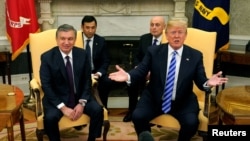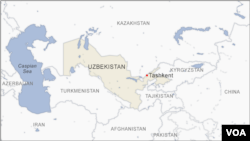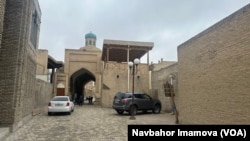Uzbekistan is expected to push to deepen relations with the United States in the coming year, a position that is broadly popular among Uzbeks across the country, VOA found during a recent reporting trip.
With more than 37 million people, Uzbekistan, Washington's strategic partner in Central Asia, accounts for more than half of the population of the region, which includes Kazakhstan, Kyrgyzstan, Tajikistan and Turkmenistan.
"I understand that the U.S. prefers dealing with us in the C5+1 format — five republics plus Uncle Sam — but we want more bilateral attention, at least for now," said Sherbek Artikov, a young Uzbek hoping to study political science in America.
Artikov is aware that many of his fellow Uzbeks are often denied U.S. visas and that hundreds of them have been deported since 2019 as undocumented immigrants. Yet, he remains optimistic: "I believe over time, Washington will see that Uzbeks are not only reliable strategic partners but also hardworking, compassionate people — both as migrants and visitors."
In recent conversations with a VOA reporter traveling across Tashkent, Ferghana, Bukhara, Samarkand and Surkhandarya, most Uzbeks expressed enthusiasm about U.S. President Donald Trump's return to the White House. They hoped his administration would foster stronger connections with the people of Uzbekistan, not just its government.
From journalists and activists to entrepreneurs and educators, they want Trump to fulfill his promises to end the wars in Ukraine and the Middle East.
"We are a peaceful region, despite the continuous turmoil in neighboring Afghanistan, but these conflicts deeply trouble us," said Zuhra Amonova, an English teacher in Bukhara.
Calls for new approach
As relations between Washington and Central Asian nations have evolved, there have been some calls by American experts for creating a new diplomatic approach, shifting the U.S. government away from grouping the countries with South Asian nations and instead aligning them more with the Caucasus.
Veteran bureaucrats who have worked with these regions at the State Department and the Pentagon told VOA that Washington's view of this part of the world has increasingly been seen through a Russian lens since the U.S. exit from Afghanistan.
Ikboljon Qoraboyev, a professor at Maqsut Narikbayev University in Astana, Kazakhstan, says the Central Asia-Caucasus proposal reflects the region's crucial role between China and Russia and the growing significance of the Middle Corridor, a transit route across the Caspian Sea that carries goods westward to European markets.
"Central Asian policymakers may welcome the change, as their previous alignment with South Asia felt misaligned with their identity," Qoraboyev told VOA. "But U.S. policymakers must recognize each country's distinct interests, rather than relying solely on regional frameworks."
Like many experts VOA spoke to, he points out that Central Asian governments are eager for closer ties with the U.S., seeking investment, political support, development aid and expanded educational and technological exchanges.
These are among the key factors in the policy recommendations by Eric Rudenshiold, a former official in the White House, Congress and USAID and now a senior fellow at the Caspian Policy Center.
"Successful U.S. engagement in the Trans-Caspian region will preserve the sovereignty and territorial integrity of the Caucasus and Central Asia," Rudenshiold said at a forum in Washington ahead of the inauguration.
He emphasized that such an approach would benefit the U.S. while creating opportunities in energy development, trade and connectivity.
Rudenshiold believes that promoting American values in this way could spur economic and political reforms in the region and shape democratic institutions.
"The Trans-Caspian region is becoming a vital geopolitical and economic crossroads, important to U.S. interests as it counters Russia's restrictions on the region's gas, oil and uranium supplies and China's efforts to control next-generation energy," he wrote in a strategic brief.
Washington needs security agreements and closer partnerships in the region, Rudenshiold argued, "due to shared concerns over renewed terrorist threats and its geostrategic location bordering Russia, China, Afghanistan and Iran."
Leaders encourage Trump visit
In congratulatory messages to Trump, regional leaders have invited him to visit. No U.S. president has ever toured Central Asia and the Caucasus.
In a letter to Trump, Uzbekistan President Shavkat Mirziyoyev wrote that his country "deeply values and appreciates the U.S. policy of consistently supporting the independence, sovereignty and territorial integrity of our nation."
He credited Trump's first term for renewing the strategic partnership, adding: "We are committed to further developing our long-term cooperation within bilateral and multilateral frameworks."
The Trump administration has yet to outline its priorities in Central Asia and the Caucasus. Rudenshiold and his center are pressing to appoint a special representative for these regions.
Javlon Vakhabov, Uzbekistan's former ambassador to the U.S. and Canada who now heads the International Institute for Central Asia in Tashkent, also advocates for deeper political dialogue.
"In an era of global uncertainty, Central Asia seeks to collectively champion its interests on the international stage and coordinate efforts to address shared challenges," Vakhabov told VOA. "A high-level U.S. visit to Uzbekistan would underscore the region's importance."
Vakhabov sees great potential in the Middle Corridor, where secondary routes via Turkmenistan and Uzbekistan could strengthen supply chains and diversify transportation lines.
He highlights the Uzbekistan-Afghanistan-Pakistan railway, "which will reduce delivery times from 35 days to just three and cut shipping costs by two-thirds."
Vakhabov agrees with Rudenshiold that U.S. support for such initiatives would enhance regional stability and attract more American businesses. Touting Uzbekistan's natural resources, he underlines that collaboration on essential minerals and rare earth elements could help the U.S. strengthen "defense, manufacturing and technological competitiveness."
Some yearn to learn
The U.S. has a long history of cooperation with Central Asian countries on counterterrorism and border security. Vakhabov recommends expanding that cooperation "since they serve common interests."
The Human Rights Watch 2025 annual report describes Central Asia as a region where autocratic regimes systematically violate freedoms, reforms are stalled or superficial, and security forces hold significant power, undermining the rule of law.
Uzbeks interviewed by VOA this winter expressed mixed views on the U.S. role in promoting justice and freedom, but most admired its democratic system.
"We need to grasp how democracy works in practice," said Dilrabo Zaripova, a small-business owner in Samarkand. "From what we saw in this U.S. presidential election, it requires a strong will and commitment. I don't think we're there yet. But having close ties with America would help us learn from its resilience and complex experience."






